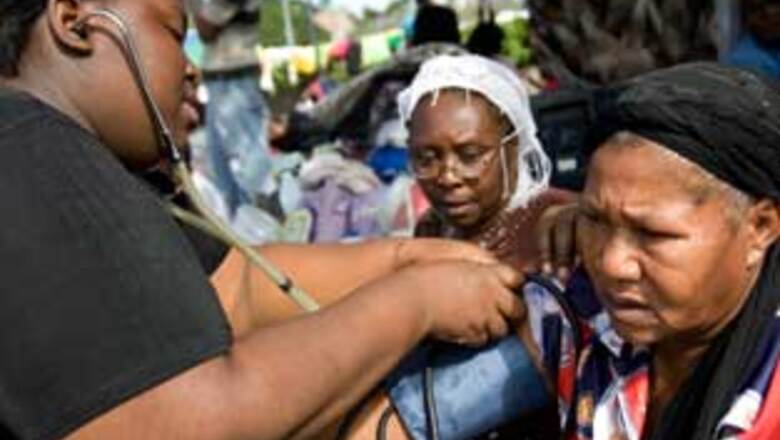
views
Washington: A mammoth relief operation slowly geared up on Thursday in a race against time to help survivors of the earthquake that devastated the Haitian capital of Port-au-Prince.
People desperately tried to free those who remained totally or partially trapped by tons of concrete, while relief teams were distributing small quantities of food as thousands of hungry and traumatized residents wandered aimlessly through the streets of the Haiti city of 1.9 million.
The capital and its surroundings were the areas hardest hit by the powerful 7.0 magnitude earthquake that struck the impoverished Caribbean country on Tuesday afternoon.
Relief workers spoke of chaotic conditions and a crippled infrastructure that made it difficult to reach people trapped under the rubble of hundreds of buildings destroyed by the quake.
After plane traffic mostly carrying relief supplies and personnel backed up at Port-au-Prince's airport, the US temporarily suspended Haitian-bound flights at the request of the Haitian government.
The true scale of the disaster remained unclear, with various government officials speaking of tens of thousands, or even up to 100,000 feared dead, and one-third of 9 million population in need of assistance.
President Barack Obama pledged an initial $100 million to Haiti, calling the quake "nothing less than devastating" and instructing all departments of the US government to make the rescue effort a top priority.
"One of the largest relief efforts in our recent history is moving towards Haiti," Obama said. The White House has asked former presidents Bill Clinton and George W Bush to help US efforts and raise money to provide relief to Haiti, spokesman Robert Gibbs said.
US aid teams were among those reaching the country from Latin America, Europe and Asia.
Teams were expected to arrive Thursday from Belgium, Luxembourg, France, Britain and Iceland. Italy, Belgium and France have medical teams on their way, while a EU assessment and coordination team is travelling to Haiti on a Belgian plane. A 220-
member Israeli team of medical and rescue experts was due to depart Thursday to help out with the recovery and treatment of quake victims.
The UN system in Haiti was trying to reorganize two days after the earthquake that collapsed its two main buildings in the capital and severely damaged offices of other UN agencies.
At least 160 UN peacekeepers were still missing and 39 have been found dead. The country is host to a UN mission of 7,000 troops and 2,000 police along with 500 foreign civilians and 1,200 local employees.
Kim Bolduc, tapped as new head of the UN mission, said Port-au-Prince at night has become a "ghost town" as people wandered and slept on streets for fear of new aftershocks. There as no electricity and water was in short quantity.
"We saw bodies as we drove around, but we cannot confirm any official overall casualties," Bolduc said.
She said the UN mission in Haiti was coordinating the humanitarian efforts as large quantity of relief supplies have arrived in the Haitian international airport, where the airtraffic tower was knocked down by the quake. The US has set up a control tower to help relief planes to land at the one-runway airport.
Further aid pledges, including $100 million from the International Monetary Fund (IMF), $10 million from Britain and $1 million from India, continued to pour in.
"Food distribution started yesterday," said Charles Vincent of the World Food Programme, "and today will start in Port-au-Prince."
Speaking in Geneva, Vincent admitted that the food going to several thousand people was a "drop in the ocean," but said aid efforts were being stepped up as supplies flow into the country.
The World Health Organization said eight hospitals were damaged or destroyed in Haiti and two others in the neighbouring Dominican Republic were also damaged.
"The main concern at the moment from the medical staff in those clinics is that the need for wound treatment and major surgery is overwhelming," Medecins Sans Frontieres (Doctors Without Borders) said in a situation update report.
Food, water, gasoline and shelter materials were all in short supply, MSF said.
Meanwhile, France said it has stopped deporting illegal immigrants from Haiti because of the earthquake. President Nicolas Sarkozy was due to meet with his government later on Thursday to discuss the situation and decide on additional aid.
France has already deployed several military transport planes and dozens of rescue workers to the capital Port-au-Prince, which suffered most of the damage.
The International Committee of the Red Cross launched a programme and website to help families in Haiti locate missing relatives.




















Comments
0 comment